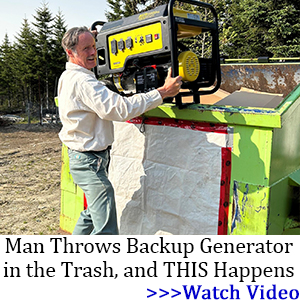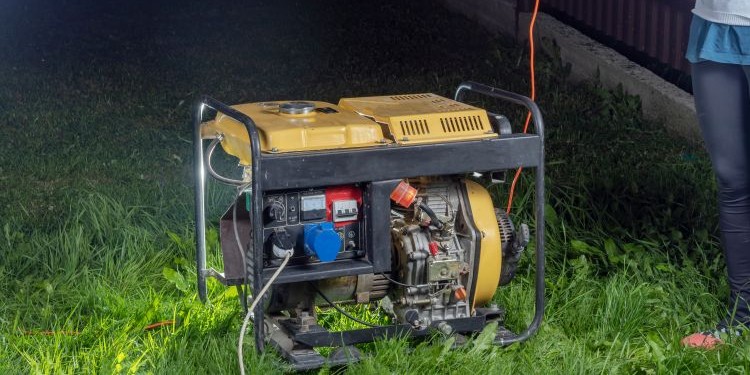(Before The Lights Go Out—And Stay Out)
Let’s get one thing straight: the grid isn’t as stable as they want you to believe. Between rolling blackouts, storms that “nobody could’ve predicted,” and a power infrastructure held together with duct tape and lobbying money, it’s not a matter of if your power goes out—it’s when.
That’s why having a generator isn’t optional anymore. It’s survival. But not just any generator. You want a propane generator for house use and here’s why the people who actually think ahead are making the switch, while everyone else is waiting for FEMA to save them.
Why Propane? Why Not Gasoline or Diesel?
Good question. Let’s start with the facts that Big Energy won’t advertise:
- Gasoline goes bad. Shelf life? Maybe 3–6 months before it starts turning into varnish.
- Diesel needs additives and can gum up in cold weather.
- Propane? It can last indefinitely when stored properly. We’re talking years without degradation.
And when the panic hits and everyone is lined up at the gas station with red cans and desperation in their eyes? You’ll be sitting pretty with a full propane tank and a generator that doesn’t care about fuel shortages or price gouging.
Propane burns cleaner, stores safer, and doesn’t leave you with sludge in your carburetor. It’s also quieter, which matters when you don’t want to alert the entire neighborhood—or looters—that you’ve still got power.
Portable vs Standby: What’s Your Threat Level?
This part depends on how deep you want to go.
Portable Propane Generator For House
- Good for: Short-term outages, camping, bug-out setups, budget-conscious preppers.
- Power output: Usually around 2,000 to 9,000 watts.
- Mobility: Easy to move, but you’ll need to start it manually (usually).
- Best for: Keeping your fridge, phone chargers, and a couple lights on during an outage.
Standby Propane Generator For House
- Good for: Long-term grid failure, severe weather zones, full-house coverage.
- Power output: 10,000 to 22,000+ watts.
- Mobility: Zero. These are hardwired into your electrical system.
- Bonus: They kick on automatically when the power cuts out. That’s right—while the rest of the block is lighting candles, yours lights up like Christmas.
If you’re planning for a real crisis—not just a weekend storm—standby is the gold standard. But if you’re mobile, rural, or just starting to prepare, portables still beat the hell out of waiting in the dark.
How Much Power Do You Actually Need?
Start with this: What do you actually want running when the grid dies?
- Fridge/freezer – 700–1,200 watts
- Well pump – 1,000–2,500 watts
- Furnace blower – 800–1,500 watts
- Lighting – 300–500 watts
- TV/laptop/charging – 100–300 watts
- Microwave – 1,000 watts
- Air conditioning – 2,000–5,000+ watts
Add it up. Now double it if you want to run multiple things at once. Don’t play games with underpowered propane generators—it’s one blown fuse away from silence and regret.
Pro tip: A 7,500-watt propane generator for house will cover the essentials in most households. A 10,000+ watt unit gets you close to full-home functionality.
Dual Fuel? Don’t Fall for the Hype—Unless…
A lot of units now come labeled “dual fuel,” meaning you can switch between propane and gasoline. Sounds great, right? Redundancy? Options?
Yes… and no.
Here’s the trick: dual-fuel generators almost always run less efficiently on gasoline than propane. And they often prioritize gas as the primary mode. So unless you’re planning to rotate fuels or want to burn through whatever old gas you’ve got lying around, stick with a propane-dedicated unit. Simpler, cleaner, fewer points of failure.
Unless you’re bugging out to who-knows-where with unpredictable resupply? Then sure—go dual. There are dual generators that are very good, we will even recommend some, but you should always burn through gas first.
Don’t Forget These “Little” Things (That Screw People Over)
- Propane Tank Size
Your standard BBQ tank (20 lb) will run a mid-size generator for maybe 6–8 hours under load. That’s it. Want real resilience? Invest in:
- 100 lb tanks for extended outages
- Or tap into your home’s large propane system if you have one
- Transfer Switch
For standby generators, a transfer switch is what makes the system automatic and safe. Without it? You’re messing with fire. Literally.
- Wattage Meter
Because “close enough” doesn’t cut it when your fridge and furnace are at stake. Know what you’re pulling, or risk frying your system—or worse.
- Cold Start Capability
Some propane generators struggle to start below 32°F. If you’re in a cold climate, make sure your unit has cold start tech or an electric starter with a battery warmer.
Top Brands That Aren’t Junk
You want gear that works when you actually need it. These names keep showing up because they’ve earned it:
- Champion – Affordable, reliable, and available in both portable and standby models
- Generac – Industry standard for whole-house propane units
- DuroMax – Tough, dual-fuel options with solid output
- Westinghouse – Feature-rich and efficient, especially in the mid-wattage range
Check the specs. Read the reviews. But most of all: test it. Don’t let your first run be during a blackout.
Recommended Propane Generator For House Use
If you’re not sure where to start, here are four propane-powered generators that consistently rise to the top. Each one meets the bar for reliability, output, and user trust — and they’re built for when you need power now, not “after tech support opens.”
If quiet efficiency and modern tech are what you want, the Westinghouse iGen4500DF delivers. With 4,500 peak watts and 3,700 running watts, this dual-fuel inverter generator is ideal for powering essentials without the noise and bulk of larger units.
Why it’s recommended:
- Inverter tech = stable power for sensitive electronics (laptops, CPAPs, TVs)
- Quiet operation (~52 dBA) makes it campground- and neighborhood-friendly
- Push-button electric start + remote key fob for lazy-day convenience
- Lightweight and compact for its output range
This is a smart choice for suburban homes, RV setups, or anyone who values portability without sacrificing capability.
Champion consistently punches above its weight in affordability and reliability, and this 4,000-watt open-frame generator is no exception. It’s dual fuel and sports a rugged frame that’s built for everyday home backup or off-grid usage.
Why it’s recommended:
- Dual fuel lets you switch between propane and gas easily
- CO Shield® technology auto-shuts down if carbon monoxide builds up
- 17+ hours runtime on propane at 25% load — that’s stamina
- Lightweight and easy to maintain
It’s a fantastic entry-level model for anyone who wants backup power without dropping four figures.
Don’t let the link confuse you—this unit outputs 5,200 watts and gives you true whole-room functionality. Generac is known for its high-quality standby units, but this portable model proves they can nail the propane game at any size.
Why it’s recommended:
- Trusted brand with strong nationwide support and service network
- Powerful enough to run a well pump, fridge, lights, and more—all at once
- Covered outlets and rugged wheels for weather and mobility handling
- Easy to switch between fuel types depending on your storage situation
Perfect for homeowners who want serious capacity without a permanent install.
This one’s the beast. With 13,000 starting watts and 10,500 running watts, the DuroMax XP13000EH is what you want when you’re powering everything—fridge, HVAC, well pump, lights, and even some power tools.
Why it’s recommended:
- Dual fuel with a powerful 500cc engine for true whole-home power
- Electric start + digital multimeter for smart monitoring
- Solid steel frame and all-terrain wheels for tough conditions
- Runs up to 8.5 hours on a 40 lb propane tank under 50% load
This is your grid-down workhorse. If you want to feel like the only house still functioning in a blackout, this unit delivers.
Final Thought: Don’t Wait for Permission
You know how it goes. Power goes out. Phones die. Grocery shelves go bare. And the guy next door who laughed at you for prepping? He’s knocking, flashlight in hand, asking for help.
A propane generator for house power is peace of mind, grid independence, and a big middle finger to a system that leaves people in the dark—literally and figuratively. It’s not paranoia. It’s preparation. And the sooner you act, the more control you keep when things unravel.
So get your generator now. Test it. Fuel it. And sleep a little easier knowing you’re not gambling on infrastructure held together by wishful thinking and 50-year-old wires.
You may also like:
 Emergency Power Supply: Backup When the Grid Goes Dark
Emergency Power Supply: Backup When the Grid Goes Dark
Do You Know Why You Should Never Put a Tall Fence Around Your House? (Video)
Deadly Mistakes You Make When Using a Generator
How to Keep Your Generator Running in Silence
EMP Proof Cloth. Easy EMP Protection For Your Car And Generator


























you mentioned phone dieing, thats why we still have a landline. it will work in a power outage. we went 11 days without power in an ice storm, cell towers down and the landline worked every day so we could keep in touch with the electric co. and tell them we still didn’t have power. at the time we didn’t have a generator but we have a dual-fuel now. i buy gas tanks at yard sales and have 10 so far and a tank cage to put them in.
I checked into the Generac whole house generator as we have propane. The salesman stated their unit would use 1 gallon of propane per hour. Considering most tanks are 500 gallons your tank would be empty if you contiguously used it after 20 days. This does not include other draws on your tank. Plus the cost of propane is not cheap, around her about 3 dollars a gallon in winter and 2 dollars in summer. 20 days is not long during an EMP.
We live almost off grid cook on a wood burning stove that also heats water and house. In my opinion forget the generator and get a good wood burning stove and kerosene lanterns.
You are absolutely right but with proper prep you do not have to use the generator continuously so those 500 gallons can actually last a really long time.
I think you have it backwards on power output with gas or propane. Check the specs and you will see the rated power output on Gas is higher than propane. That is because propane has less BTU’s of power per gallon than propane.
Thank you for this article. What I want is something to recharge my Ecoflow solar generators to supplement the solar panels. It would only run until they were fully recharged. Would the DuroMax 5,500 watt generator be sufficient? The 13,000 watt would be overkill for my needs.